The 50th Session of the Human Rights Council
13 June – 18 July 2022
Agenda Item 4 – Human Rights Situations that Require the Council’s Attention
Interactive Dialogue with the Special Rapporteur on the Situation of Human Rights in Myanmar
29 June 2022
By Ardya Syafhana and Makaela Fehlhaber / GICJ
Executive summary
On the 29th of June 2022, the Special Rapporteur on the Situation of Human Rights in Myanmar (SR), Mr Thomas Andrews, delivered an oral update on the ongoing crisis. Earlier, on the 14th of June, the UN Human Rights Council (UNHRC) heard from the High Commissioner for Human Rights, Ms Michelle Bachelet, regarding the ongoing humanitarian crisis in Myanmar. Mr Andrew’s sentiments largely reflected that of Ms Bachelet, highlighting the attacks on non-combatants since the military coup, the infringement of rights of those arbitrarily detained, and the desire to prosecute prepetrators for their crimes constitutive of genocide, war crimes, and crimes against humanity.
On the Agenda of this meeting, the SR prepared a conference paper concerning military operations targeting children and other grave violations of children’s rights. Hundreds of children in Myanmar died or were maimed during the battle between the Tatmadaw and opposition armed groups; some even became the object of anti-personnel mines and unexploded ordnance. As previously addressed in the UNHRC 49th session, the military junta in Myanmar (Tatmadaw) continued to use arbitrary means to eliminate anyone who opposed its governance. Widespread enforced disappearances and torture also became a daily threat to the people in Myanmar. The paper also revealed that such means had no mercy on children; thousands of whom had been detained, and some tortured to death. The SR recalled the recommendation in its report along with the conference paper at the UNHRC 49th session to draw attention to the cessation of arms transfer to Tatmadaw and its affiliates. Hence, he further invited the International Community to immediately and effectively act on this crisis before Myanmar finally loses its generation.
Mr Andrews opened the discussion by highlighting specific figures that demonstrate the sheer brutality of the conflict. He described grave situations faced by vulnerable persons, including torture and imprisonment, as well as the impact of the conflict for the future restoration of democracy and peace-building within the nation. His call to the countries in attendance was simple: the actions taken had yielded no results, the matter required attention by the United Nations Security Council (UNSC), and a coalition of states should be formed to demonstrate support for the people of Myanmar. In his address, Mr Andrews focused on the harm suffered by children within Myanmar, and the struggles that they will face long-term, should a solution not be implemented immediately. Delegates followed suit and expressed their dismay at the action (or rather the lack thereof) taken to date, and encouraged Myanmar’s compliance with the orders of the International Court of Justice (ICJ), along with recommendations of other international bodies. Representatives from Non-Governmental Organisations (NGOs) offered their insight and pressed for global unity on the matter and the need for immediate internal humanitarian assistance.
Geneva International Centre for Justice (GICJ) strongly condemns the military junta’s use of violence against civilians and calls for the UN Member States to pressure them to cease this human rights catastrophe. For the past 17 months, the Tatmadaw has shown no intention to comply with international law, in particular, the law of armed conflict and human rights law. The civilian loss increases every day and children are in the most vulnerable state more than ever. GICJ calls for renewed strategies for humanitarian assistance and greater implementation of international pressure on military authority in Myanmar.
Background
Due to the political instability in Myanmar, a Special Rapporteur for the human rights situation in Myanmar was appointed in 1992. Commission on Human Rights, based on its decision 58/1992, assigned the special rapporteur to establish direct contact with the government and people of Myanmar to examine the human rights situation in Myanmar and follow any development in the political restoration therein. During the next general election held in Myanmar, the special rapporteur was requested to report on the electoral process and to identify priorities and benchmarks for technical assistance and capacity-building. In the massive exodus of Rohingya refugees and the alleged Genocide in Myanmar, the work of the special rapporteur focused on the human rights documentation (in a form of written or oral report) and thematic research about specific human rights concerns raised in the country (in a form of research paper). On 1 February 2021, the military power in Myanmar led by Senior General Min Aung Hlaing launched a coup against the democratic government of President Wint Myint and State Counsellor Aung San Suu Kyi. While those two leaders of the National Unity Government were captured and detained, human rights and humanitarian law continued to be undermined by the junta. As the government denied access in 2017, the SR mainly relies on the cooperation of UN Members such as Bangladesh or Malaysia in giving access to investigate the situation in Myanmar.
Report of Special Rapporteur in the UNHRC 49th Regular Session
During the 49th session, the SR unveiled the “probable” crimes against humanity and war crimes committed in Myanmar by the Tatmadaw (Report A/HRC/49/76). This conclusion was due to the continuous indiscriminate attack, mass extrajudicial killings, detention, and torture carried out by the military authority. Mortality, disability and Internally Displaced Persons (IDP) rates have intensified mostly through the junta’s aerial bombardment in addition to widespread arson and looting of civilian property. People in Myanmar also faced harrowing security operations where the participants of peaceful protest or any form of opposition toward the government became the target of arbitrary arrest, detention and even unfair trial resulting in death from torture. Gender-based violence, the deterioration of children’s rights, and Rohingya discrimination issues were even more unsettling. The situation was worsened by an obstruction of humanitarian aid delivery and the internet blackout sanctioned by the military government. The SR strongly urged the adoption of the UNSC to treat this crisis as a “threat to international peace and security” under Chapter VII of the UN Charter to help find concrete solutions to aid the people of Myanmar. In this regard, the SR placed emphasis on the urgency to impose asset seizure and halt the arms transfer with Tatmadaw. UN Members and the international business community were expected to collectively put pressure on the Tatmadaw to bring the crisis to an end.
Conference Paper of the Special Rapporteur on the Transfer of Arms
A conference paper was drafted along with Report A/HRC/49/76 which detailed the SR's views to support the discontinuation of the arms transfer to the Tatmadaw and the legal analysis in the respected context (Paper A/HRC/49/CRP.1). The SR cited UN General Assembly Resolution Number A/Res/75/287 (Res A/Res/75/278) which called for UN members to prevent the flow of arms into Myanmar. This was preceded by the recommendation of the International Fact-Finding Mission on Myanmar (FFM) in 2018 which FFM found the “genocidal intent” of the military in running the “clearance operations” against Rohingya in 2017. At the time the paper was published, there were at least nine countries involved in the transfer and commitments of arms. They were the People’s Republic of China, Russian Federation, Serbia, India, Pakistan, Belarus, Ukraine, Israel and the Republic of Korea. The SR put forward three main frameworks to argue the responsibility of the states concerned in the arms embargo covering International Humanitarian Law (Common Article 1 of Geneva Conventions 1949), Customary International Law in State Responsibility (Article 16 of the International Law Commission’s (ILC) draft Articles on Responsibility of States for Internationally Wrongful Acts) and Arms Trade Law (Article 6 of the Arms Trade Treaty). All in all, he underlined the alleged genocide and crimes against humanity in Myanmar as the grounds for the states concerned to comply with its international law obligation and, above all, the frameworks contained in the paper.
Conference Paper of the Special Rapporteur on the Crisis for Children in Myanmar
Submitted for the UNHRC 50th session, the SR presented the alarming condition of children of Myanmar in the middle of the crisis. The paper further disclosed data of child victims under Tatmadaw’s atrocities: 382 killed or maimed, 1.400 detained (142 reportedly have been tortured), and 250.000 IDPs. Conflicting parties (Tatmadaw and non-state armed groups) did not hesitate to use anti-personnel mines and unexploded ordnance which is known to exacerbate the civilian casualties, including children. The report also mentioned several strong submissions that children have been used as human shields and forced into military training and recruitment. Tatmadaw also denied the fundamental rights of health and education to children. However, this claim can be supported by the fact that the lives of over 33,000 children are endangered due to missed immunisations and around 1.3 million children continue to suffer from a lack of nutritional support.
Moreover, with continued attacks on schools, about 7.8 million children are deprived of their formal education. Lastly, Myanmar’s situation has pushed more children to become victims of exploitation and abuse by their caretakers or parents. Hence, the SR accordingly, urges the international community to respond to the crisis in Myanmar with the same urgency as in Ukraine. The ongoing hardship endured by children is enough to convince UN member states to redesign the recent policy for the state’s situation before they become “a lost generation”. The SR reiterated his view on the need for the UNSC resolution and arms embargo or economic sanctions on the Myanmar military. On the other side, he also recommended, including but not limited to, the stepdown of the Tatmadaw along with the State Administrative Council, the denial of the military leadership legitimacy in any circumstances, especially for the Association of Southeast Asian Nations (ASEAN) members and the establishment of civilian government for Myanmar in the future.
The Oral Update at the HRC 50 session by the Special Rapporteur
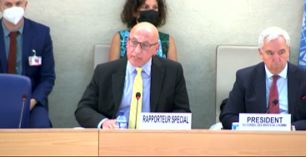 Mr Thomas Andrews, Special Rapporteur on the situation of human rights in Myanmar, delivered his oral update on the situation of human rights in Myanmar on the 29th of June 2022. In what was described by Mr Andrews as a “brutal campaign”, he drew attention to the acceleration of the ongoing human rights crisis in Myanmar. In the last 3 months, Mr Andrews reported that 2,500 individuals had been killed as a result of the junta’s military campaign. Over 1 million individuals had been internally displaced. Nearly 11,000 individuals had been illegally obtained. Political activists had been put on death row. Relentless attacks against non-combatants have resulted in “massacres of unarmed civilians”. The actions described, according to the SR, constitute evidence of war crimes and crimes against humanity committed within the territory of Myanmar.
Mr Thomas Andrews, Special Rapporteur on the situation of human rights in Myanmar, delivered his oral update on the situation of human rights in Myanmar on the 29th of June 2022. In what was described by Mr Andrews as a “brutal campaign”, he drew attention to the acceleration of the ongoing human rights crisis in Myanmar. In the last 3 months, Mr Andrews reported that 2,500 individuals had been killed as a result of the junta’s military campaign. Over 1 million individuals had been internally displaced. Nearly 11,000 individuals had been illegally obtained. Political activists had been put on death row. Relentless attacks against non-combatants have resulted in “massacres of unarmed civilians”. The actions described, according to the SR, constitute evidence of war crimes and crimes against humanity committed within the territory of Myanmar.
Amongst these heinous acts, children within the state have faced brutal conditions. Approximately 250,000 children have been internally displaced while 382 have been killed or maimed. An excess of 1,400 has been arbitrarily detained. Children have been beaten, stabbed, cut, burned with cigarettes, sexually assaulted, and been the victim of various torture techniques. What looms on the evidence presented to him is a food crisis forcing children into malnutrition placing them in a more vulnerable position to be exploited through trafficking, labour and forced marriage. The data presented paints the “devastating and deteriorating conditions in Myanmar” leading to only one conclusion: the approach thus far adopted by the UNHRC is not working to address the grave humanitarian crisis unfolding beneath the eyes of the Council.
In reviewing the action taken to date, Mr Andrews conceives ASEAN’s Five Point Consensus as failing to invoke “any tangible outcomes”. The United Nations Security Council has yet to issue a resolution on the matter, leaving the people of Myanmar to continue to wait for action by the international community. Only 10.5% of the budget assigned to the Humanitarian Response Plan for Myanmar has been spent, an “unconscionable” decision to leave thousands in an ongoing humanitarian crisis. Mr Andrews strongly urged the international community to reassess its efforts to resolve the situation in Myanmar and reconsider action taken to date. The SR proceeded to list a number of actions States could choose to take to effectively address the ongoing situation including the implementation of robust funding toward humanitarian aid, depriving the Tatmadaw of funds which it relies upon to sustain its attacks, and directing support toward accountability mechanisms and pushing for a UNSC vote on the matter even if the risk of a veto is exercised. In Mr Andrews' words, he urged states to “choose action over indifference”.
Interactive Dialogue on the Special Rapporteur’s Oral Update
Ms Anna Jardfelt, the delegate of Sweden, on behalf of the Nordic countries, strongly condemned the coup and called for “...an immediate end to all forms of violence including sexual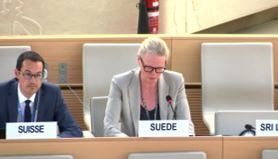 and gender-based violence, mass killings, torture, air strikes and arson”. The delegate identified the responsibility of the international community in ensuring accountability for past and ongoing crimes as a critical step toward restorative justice. In addition, the delegate requested Myanmar’s cooperation to permit full and unimpeded humanitarian access to ensure those victims of the armed conflict are properly attended to.
and gender-based violence, mass killings, torture, air strikes and arson”. The delegate identified the responsibility of the international community in ensuring accountability for past and ongoing crimes as a critical step toward restorative justice. In addition, the delegate requested Myanmar’s cooperation to permit full and unimpeded humanitarian access to ensure those victims of the armed conflict are properly attended to.
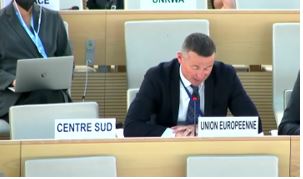 Mr Thomas Wagner on behalf of the European Union strongly condemned the military coup as well as ongoing and past violations of human rights violations committed within Myanmar. The delegate reiterated the desire of the European Union to see Myanmar’s “prompt return to the path of democracy”. To achieve this, the EU requested full accountability from the perpetrators of these abuses and ensuring victims of said abuses receive full and unimpeded humanitarian assistance. The delegate further expressed the need for further protections to ensure that they are not forced, as vulnerable persons, into situations of exploitation.
Mr Thomas Wagner on behalf of the European Union strongly condemned the military coup as well as ongoing and past violations of human rights violations committed within Myanmar. The delegate reiterated the desire of the European Union to see Myanmar’s “prompt return to the path of democracy”. To achieve this, the EU requested full accountability from the perpetrators of these abuses and ensuring victims of said abuses receive full and unimpeded humanitarian assistance. The delegate further expressed the need for further protections to ensure that they are not forced, as vulnerable persons, into situations of exploitation.
Pakistan (on behalf of the Organisation of Islamic Cooperation), Mr Junaid Suleman highlighted that the ongoing situation in Myanmar saw a constant violation of the right to life and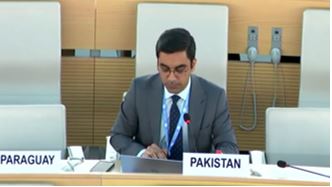 citizenship of the Rohingya population. Mr Suleman condemned the continuing violence against not just the Rohingya population, but other minorities suffering at the hands of discrimination within the region. While almost five years have passed since 1 million individuals fled to Bangladesh, the delegate claimed that no progress had been made to address the refugee crisis. The Organisation of Islamic Cooperation requested a permanent solution to the crisis and urged Myanmar to comply with the decisions of the ICJ and other international bodies.
citizenship of the Rohingya population. Mr Suleman condemned the continuing violence against not just the Rohingya population, but other minorities suffering at the hands of discrimination within the region. While almost five years have passed since 1 million individuals fled to Bangladesh, the delegate claimed that no progress had been made to address the refugee crisis. The Organisation of Islamic Cooperation requested a permanent solution to the crisis and urged Myanmar to comply with the decisions of the ICJ and other international bodies.
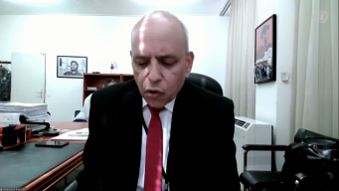 The Bolivarian Republic of Venezuela, Mr Felix Pena Ramos, began the statement by criticising the absence of a delegation from Myanmar. The delegate further proclaimed its opposition to the content as well as the sources in the SR’s report which he regarded as “serious imbalances”and “unverified information from sources that are impossible to corroborate”. Throughout his statement, Venezuela consistently criticised the mandate of the SR, deeming it repulsive. The delegate reminded the member states to respect Myanmar's right to self-determination, state sovereignty and internal affairs. The delegate recommended national reconciliation by Myanmar and reaffirmed the Universal Periodic Review as the ideal mechanism for this situation.
The Bolivarian Republic of Venezuela, Mr Felix Pena Ramos, began the statement by criticising the absence of a delegation from Myanmar. The delegate further proclaimed its opposition to the content as well as the sources in the SR’s report which he regarded as “serious imbalances”and “unverified information from sources that are impossible to corroborate”. Throughout his statement, Venezuela consistently criticised the mandate of the SR, deeming it repulsive. The delegate reminded the member states to respect Myanmar's right to self-determination, state sovereignty and internal affairs. The delegate recommended national reconciliation by Myanmar and reaffirmed the Universal Periodic Review as the ideal mechanism for this situation.
United States of America, Ms Michele Taylor remained firm in assent to the SR report and mandate in relation to exposing the human rights and humanitarian crisis perpetrated by the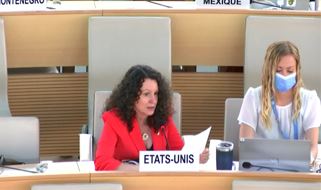 junta. The delegate further deplored the military’s escalation of violence and abuses for instance extra-judicial killings, enforced disappearances, gender-based violence and torture. Taking serious note of the military blockade on humanitarian aid and attack targeting humanitarian workers, the USA supported the call for the international arms embargo and economic action targeting Tatmadaw’s assets and its affiliates. Lastly, the delegate asked about the most effective means to coordinately pressure Myanmar military leadership.
junta. The delegate further deplored the military’s escalation of violence and abuses for instance extra-judicial killings, enforced disappearances, gender-based violence and torture. Taking serious note of the military blockade on humanitarian aid and attack targeting humanitarian workers, the USA supported the call for the international arms embargo and economic action targeting Tatmadaw’s assets and its affiliates. Lastly, the delegate asked about the most effective means to coordinately pressure Myanmar military leadership.
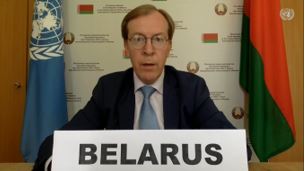 The delegate of Belarus, Mr Andrei Taranda, took a similar stance as Venezuela and stated its disagreement toward the adoption of a country-specific resolution or mandate without the consent of the state concerned. Belarus called on the UN Member states to rethink the pressure-driven approaches undertaken till the present day. Yet, they reiterated Belarus being in favour of peaceful dialogue and cooperation instead.
The delegate of Belarus, Mr Andrei Taranda, took a similar stance as Venezuela and stated its disagreement toward the adoption of a country-specific resolution or mandate without the consent of the state concerned. Belarus called on the UN Member states to rethink the pressure-driven approaches undertaken till the present day. Yet, they reiterated Belarus being in favour of peaceful dialogue and cooperation instead.
Mr Arthur Chernyakov, representing Russian Federation, further underscored the negative sentiment on threats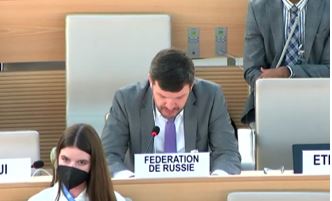 and sanctions pressure against the Myanmar government. Russia supported the role of ASEAN in setting up constructive cooperation at the regional level and the international mechanism for constructive dialogue with Myanmar. It is argued that the use of threats and pressure under the human rights pre-text against a state has never resolved the human rights situation. The delegate closed its statement about the importance of involving all states linked to the discussion, in particular, the delegate from Myanmar.
and sanctions pressure against the Myanmar government. Russia supported the role of ASEAN in setting up constructive cooperation at the regional level and the international mechanism for constructive dialogue with Myanmar. It is argued that the use of threats and pressure under the human rights pre-text against a state has never resolved the human rights situation. The delegate closed its statement about the importance of involving all states linked to the discussion, in particular, the delegate from Myanmar.
Thereafter, the floor was given to NGOs. The sentiments shared by orators were consistent in their desire for the atrocities within Myanmar to cease immediately. Highlighted in the statements was the inability of individuals in Myanmar to access internet services freely. This not only curbs one’s freedom but also hinders citizens from broadcasting their plights to the rest of the world. Further, the criminalisation of the acts of journalists reporting on the conflict constitutes a hateful act that violates numerous rights, including the right against arbitrary detention, the right to life, and the right against torture. A consistent theme was the end of impunity to ensure that accountability will be pursued for the ported war crimes, crimes against humanity and genocidal acts of the Tatmadaw and others involved. Many delegations spoke of the airstrikes that were endangering the lives of those who lived within those areas and reiterated the importance of adhering to principles of international humanitarian law.
Concluding Remarks
The SR, in his concluding remarks, addressed the questions posed to him throughout the session. The predominant questions posed reflected the protection of children in armed conflict, and what collective actions states could take to address the situation. Mr Andrews said he felt “encouraged” by the statements made by delegates and into all work that had been done by the international community for Myanmar. However, the actions taken until today are just insignificant to the peacebuilding effort and people’s welfare in the country. He proposed, in response to the questions raised, the convening of a coalition of member states willing and ready to provide sustained support even if the UNSC fails to take action. This would amount to a public demonstration of unity with Myanmar, and inaction by the UNSC worsens the matter. This platform would also allow the states, as part of the coalition, a vehicle to strategise their efforts and discuss effective sanctions that could be imposed. The intention would be to deprive the military of the resources it currently relies upon.
Position of Geneva International Centre for Justice
Geneva International Centre for Justice (GICJ) welcomes the oral update by the SR and other organisations involved in the effort of human rights documentation of the violations in Myanmar including FFM and civil society. GICJ strongly condemns any forms of violence used by the Tatmadaw against the civilian population, let alone children. The present update in addition to the update of the High Commissioner on 14th June 2022 affirms that the allegation of war crimes and crimes against humanity in Myanmar goes beyond baseless theories; there were real victims fallen in this crisis. GICJ concurs with the SR’s stance that the actions taken by the international community to date are insufficient to effectively evoke change for those suffering as a result of the situation in Myanmar. The ongoing conflict resulting in the deaths of non-combatants, along with the torture and arbitrary detention of children and political activists needs to cease immediately.
GICJ further calls upon members of the international community to impose sanctions and arms embargo to impede the ability of the Tatmadaw from furthering the escalation of conflict within the country. A compromise to the state atrocities will only allow more bloodshed and absolute abuse of power. In addition to the adoption of the UNSC resolution, UN Member states need to design and organise collective action for the pursuit of international accountability and humanitarian assistance for the people in need. GICJ strongly urges the international community to continue assisting the work of human rights fact-finding mechanisms, particularly the investigation by UN bodies and the International Criminal Court with regard to war crimes, crimes against humanity, including genocide against the Rohingya Muslim population of Myanmar.
Tatmadaw, Myanmar, Special Rapporteur, Rohingya, Rohingya Muslim, United Nations, Geneva4Justice, GICJ, Geneva International Centre for Justice, Justice




